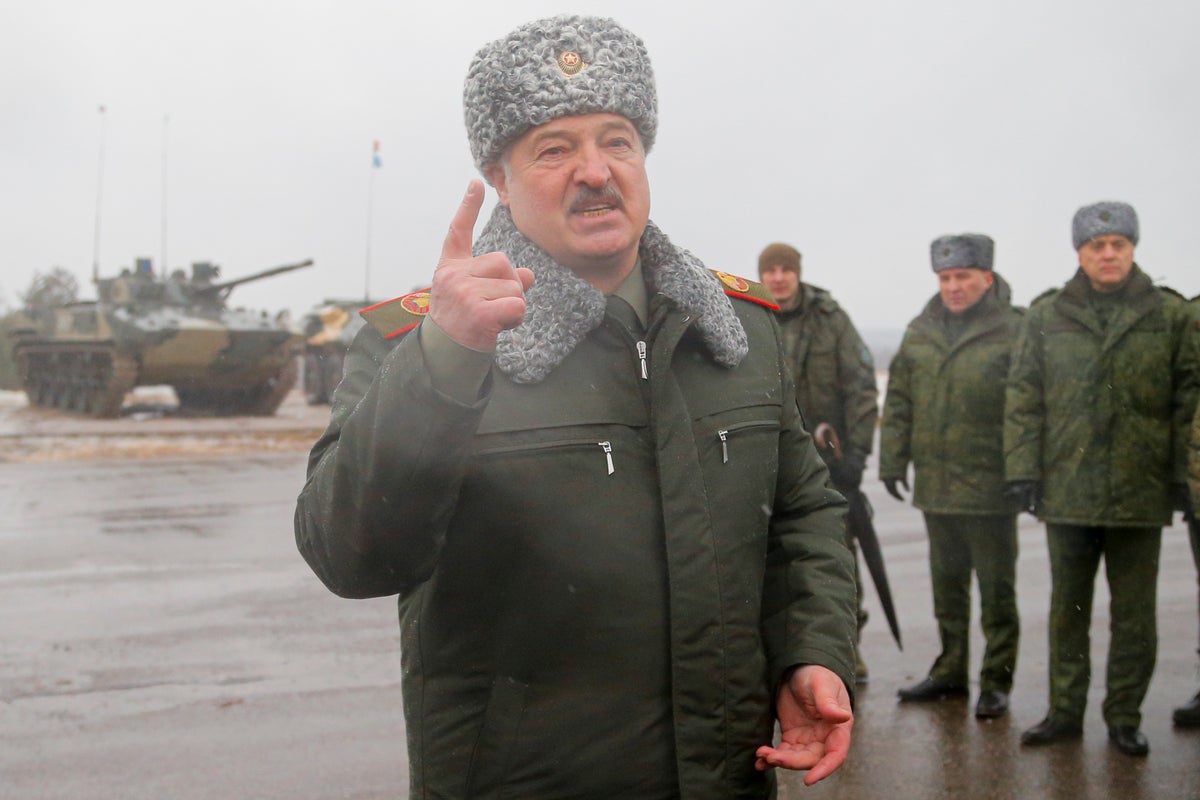
Belarus is ready to “wage war” alongside Russia in Ukraine if it is attacked, the country’s president Alexander Lukashenko has said.
“I’m ready to wage war, alongside the Russians, from the territory of Belarus. But only if someone – even a single soldier – enters our territory from there [Ukraine] with weapons to kill my people,” he said. “If they commit aggression against Belarus, the response will be the most severe, and the war will take on a completely different nature.”
Russia used Belarus to help launch its invasion of Ukraine last year, with its failed offensive on the Ukrainian capital of Kyiv starting from the country. Military cooperation between the two nations has been on the increase in recent months, with a number of air force drills and the formation of a joint military group, raising fears in Kyiv that Minsk could be preparing to play a more active role in the conflict.
Mr Lukashenko has repeatedly denied such claims, saying that his nation will not be dragged into the conflict by Moscow. He said that he is due to meet the Russian president, Vladimir Putin, on Friday. Mr Lukashenko blamed Western governments for fuelling the war, echoing Mr Putin’s claims that Nato is “escalating” the conflict. “If you continue this escalation, you will get nuclear weapons and Russia has more than anyone,” he said.
However, he also suggested that he could help play peace-broker, something that Western allies of Ukraine will take with a pinch of salt. “If a nuclear war starts, Belarus will cease to exist,” he said. “We need to sit down at the negotiating table, because nuclear war will wipe out the USA too. No one needs this.”
The Belarusian leader’s words came hours after Russia rained more than 30 missiles down on Ukraine, sending people in a number of regions running for shelter as air raid sirens sounded. About 16 missiles were shot down, Ukraine’s air force said, a lower number than normal.
“Another massive missile attack... on civilian infrastructure in Ukraine,” the Ukrainian defence ministry tweeted. Ukraine said the barrage included three KH-31 missiles and one Oniks anti-ship cruise missile, which its air defences cannot shoot down. Police in Moldova, where parliament approved a new pro-Western government on Thursday, said they found missile debris near the border with Ukraine, as they have done a number of times.
On the frontlines, Russia has been concentrating much of its troop and artillery power on the eastern regions of Donetsk and Luhansk, which together make up Ukraine’s industrial heartland known as the Donbas – which Moscow seeks to control. One focus is the city of Bakhmut in Donetsk, which has seen intense fighting for months. “They [the Russians] are sending a lot of troops. I don’t think that is sustainable for them to keep attacking this way,” the Ukrainian 80th Air Assault Brigade’s press officer, Taras Dzioba told Reuters. “There are places where their bodies are just piled up. There is a trench where... they just don’t evacuate their wounded or killed.”
In Kyiv, Labour leader Sir Keir Starmer was set to meet with President Volodymyr Zelensky and vowed that the UK’s commitment to supporting Ukraine in its struggle against Russia would “remain the same” if he becomes prime minister. The Israeli foreign minister, Eli Cohen, and his Canadian counterpart Melanie Joly also visited Kyiv. Mr Cohen was also due to meet Mr Zelensky in the first such visit during the war from Israel, which coordinates with Russia over strikes on suspected Iranian targets in Syria and has stopped short of pledging direct weapons supplies to Kyiv. Ms Joly met the country’s first lady Olena Zelenska and announced C$21.2m (£13.1m) in aid to address conflict-related sexual violence and demining of Ukraine, among other work.
Mr Zelensky was also due to open the Berlin Film Festival via video later on Thursday.
Elsewhere, Russia and Ukraine exchanged 101 prisoners of war in their latest prisoner swap. “Aircraft of the military transport aviation of the Russian Aerospace Forces will deliver the released servicemen to Moscow for treatment and rehabilitation in medical institutions of the Russian Defence Ministry,” Moscow said.
Mr Zelensky’s chief of staff, Andriy Yermak, said 100 troops and one civilian had been returned. Nearly all of those released had been defending the besieged southern city of Mariupol before it fell to Russian forces, Mr Yermak said on Telegram.
Earlier this month, Mr Zelensky said that since the start of the conflict last February, Ukraine had secured the release of 1,762 men and women from Russian captivity.







